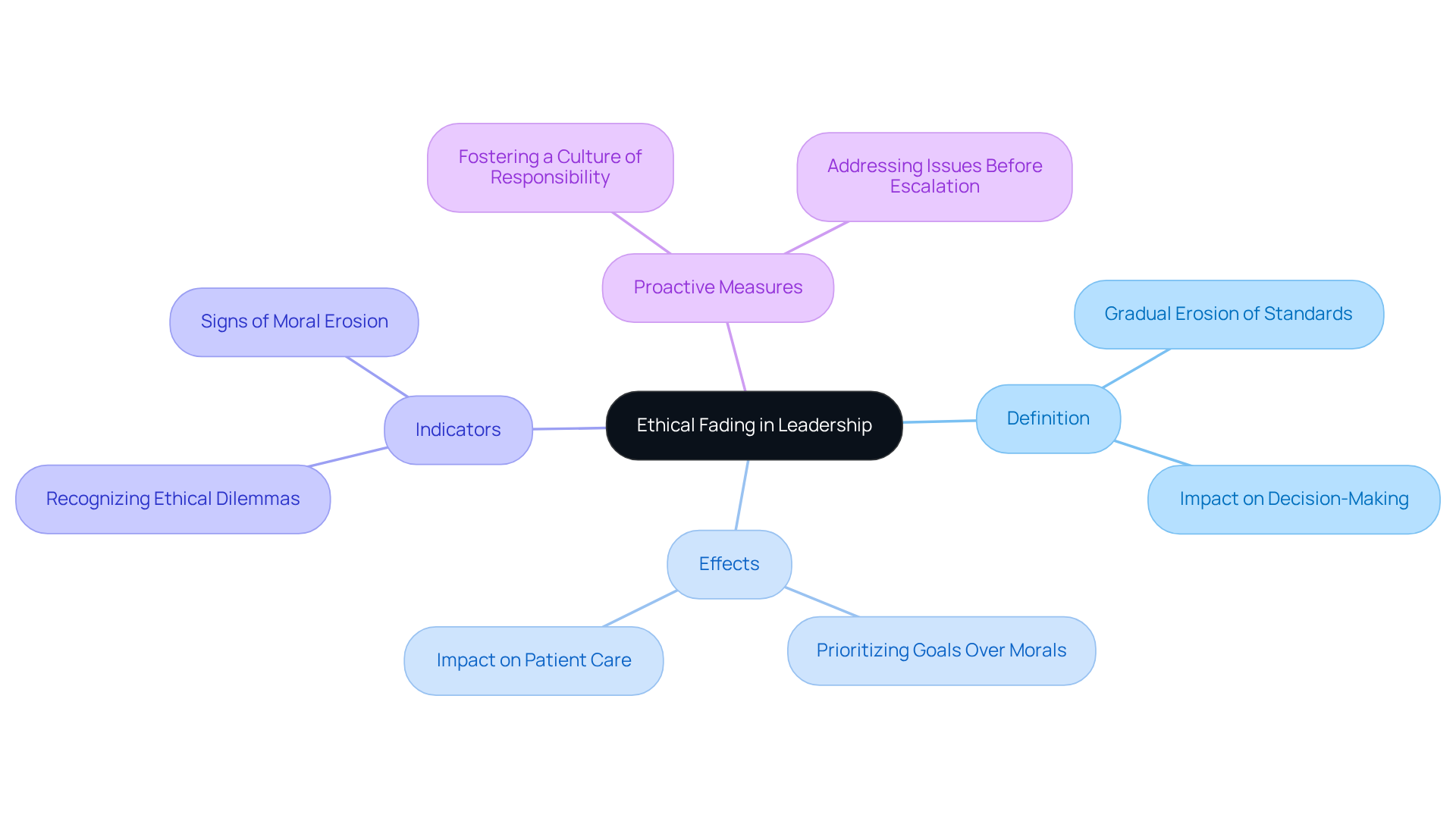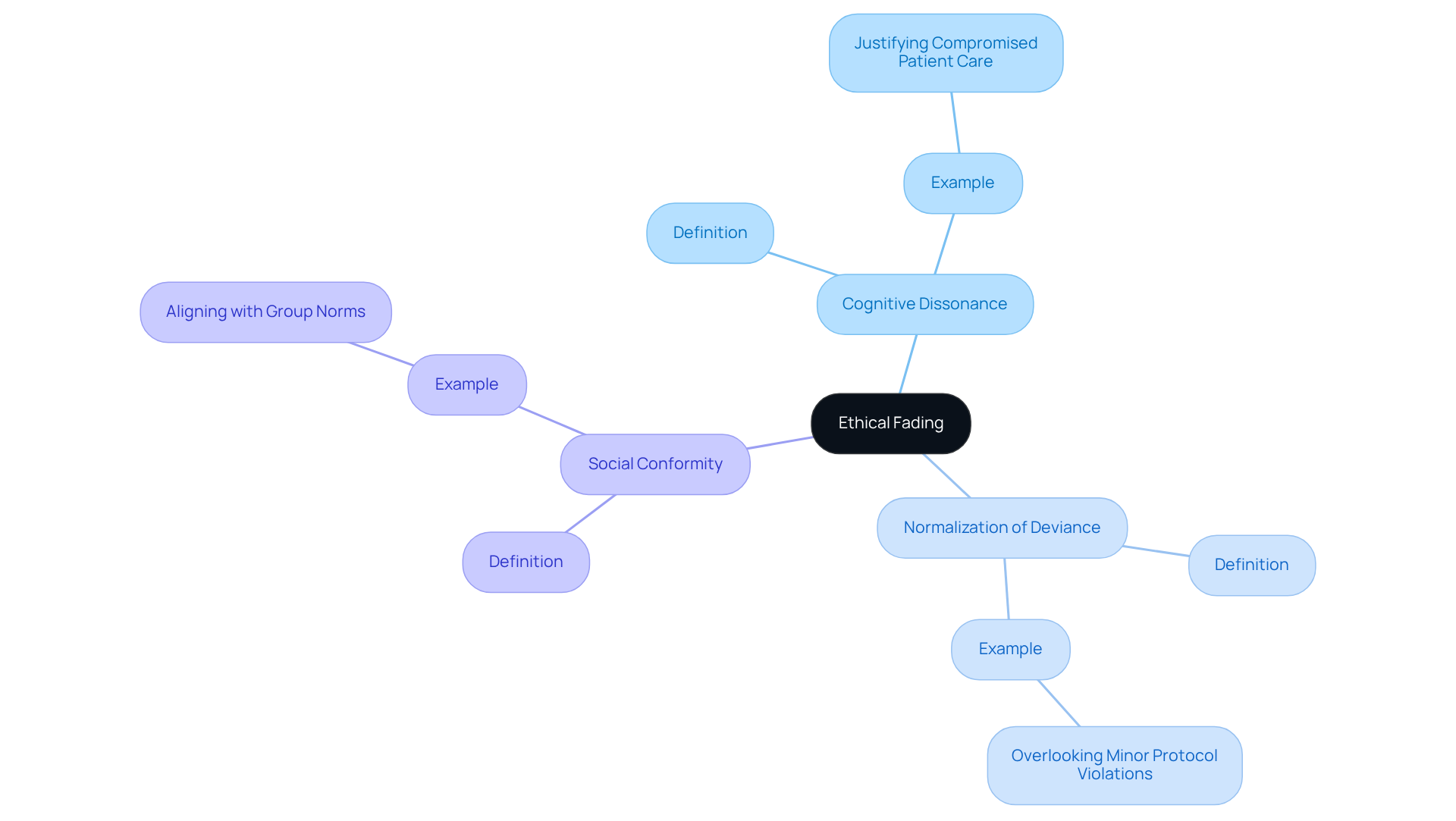September 7, 2025

The article highlights the critical issue of ethical fading in healthcare leadership, underscoring the necessity for leaders to identify its indicators and implement effective strategies to uphold ethical standards. It elucidates the psychological mechanisms that contribute to ethical fading, including cognitive dissonance and social conformity. Furthermore, it presents practical strategies such as:
These strategies are essential to cultivating a culture of integrity and accountability within healthcare organizations.
Ethical fading represents a critical challenge in healthcare leadership, where the drive to achieve organizational objectives can eclipse ethical obligations. Recognizing this issue is essential for leaders committed to upholding integrity and prioritizing patient care.
What specific strategies can healthcare executives adopt to counteract ethical fading and cultivate a culture of accountability within their organizations?
Ethical fading signifies the gradual erosion of standards and considerations in decision-making processes. In the realm of leadership, ethical fading can result in decisions that prioritize organizational goals over moral responsibilities, ultimately jeopardizing patient care and professional integrity.
For health executives, recognizing the indicators of ethical fading is essential in fostering a culture of responsibility and integrity. By understanding its implications, leaders can proactively address potential moral dilemmas before they escalate into larger issues, thereby ensuring that their organizations uphold the highest standards of care and compliance with industry regulations.

Several psychological mechanisms, particularly cognitive dissonance, normalization of deviance, and social conformity, significantly influence ethical fading in medical settings. Cognitive dissonance occurs when individuals experience discomfort from holding conflicting beliefs, often prompting them to rationalize unethical actions to alleviate this tension. For instance, a medical professional may justify compromising on patient care due to time constraints, despite recognizing that such actions contradict their ethical responsibilities.
Normalization of deviance involves the gradual acceptance of unethical practices as typical behavior, especially when these practices yield immediate benefits. In medical environments, this can manifest as a team consistently overlooking minor protocol violations, perceiving them as harmless or efficient. Over time, this leads to a culture where unethical behavior becomes normalized.
Social conformity exerts pressure on individuals to align their actions with group norms, even when these norms conflict with moral standards. In a medical setting, if the prevailing mindset among peers prioritizes efficiency over patient well-being, individuals may feel compelled to conform, thereby undermining their moral judgment.
By comprehending these mechanisms, organizational executives can proactively identify situations where ethical fading is likely to occur and implement strategies to mitigate its impacts. This approach promotes a culture of integrity and accountability within their institutions.

Healthcare leaders must implement several critical strategies to combat ethical fading. First, establishing clear ethical guidelines is essential. Developing and communicating a robust code of ethics that outlines expected behaviors and decision-making processes is vital. Training all staff members on these guidelines ensures a unified understanding of ethical standards.
Next, encouraging open dialogue fosters an environment where employees feel comfortable discussing moral concerns without fear of retribution. Regular gatherings to discuss moral dilemmas and promote feedback can significantly enhance ethical awareness within the organization.
Moreover, leaders should model righteous conduct. By exemplifying principled behavior in their decision-making processes, leaders can inspire their teams to adopt the same dedication to moral principles.
Additionally, regular training and education on moral decision-making and the implications of ethical fading are necessary. Ongoing training reinforces the importance of ethics in daily operations, ensuring that ethical considerations remain at the forefront of organizational practices.
Finally, monitoring and evaluating organizational practices is crucial. Regular assessments of decision-making processes help identify potential areas where ethical fading may occur. Implementing corrective measures as necessary upholds moral standards and strengthens organizational integrity.
By employing these strategies, healthcare leaders can cultivate a culture that prioritizes ethical considerations, ultimately enhancing patient care and reinforcing their commitment to organizational integrity.

Ethical fading presents a formidable challenge for healthcare leaders, as it can result in decisions that jeopardize patient care and erode professional integrity. Addressing this issue is vital for cultivating a culture of accountability and ethical responsibility within healthcare organizations. By identifying the signs of ethical fading and implementing effective strategies to counteract it, leaders can ensure that their institutions prioritize moral considerations alongside operational objectives.
The article delineates several key mechanisms that contribute to ethical fading, including:
These psychological factors can significantly distort decision-making processes, underscoring the necessity for leaders to grasp their implications. By establishing clear ethical guidelines, fostering open dialogue, modeling ethical behavior, providing ongoing training, and regularly evaluating practices, leaders can adeptly mitigate the risks associated with ethical fading.
Ultimately, the importance of tackling ethical fading cannot be overstated. By prioritizing ethics in leadership, healthcare organizations can elevate patient care, uphold professional standards, and foster an environment where moral considerations are paramount in decision-making. Leaders are urged to take proactive measures in implementing these strategies, ensuring that integrity and ethical responsibility remain central to their organizational culture.
What is ethical fading?
Ethical fading is the gradual erosion of standards and considerations in decision-making processes, leading to decisions that may prioritize organizational goals over moral responsibilities.
How does ethical fading impact leadership?
In leadership, ethical fading can result in decisions that jeopardize patient care and professional integrity by prioritizing organizational objectives over ethical considerations.
Why is it important for health executives to recognize ethical fading?
Recognizing ethical fading is essential for health executives as it helps foster a culture of responsibility and integrity within their organizations, ensuring high standards of care and compliance with industry regulations.
What can leaders do to address ethical fading?
Leaders can proactively address potential moral dilemmas by understanding the implications of ethical fading, allowing them to intervene before issues escalate into larger problems.
Our expert recruitment strategies and AI-driven sourcing ensure that you receive top-notch candidates quickly, without compromising on quality. Whether you’re looking for BCBAs, Clinical Directors, or RBTs, we’ve got you covered.